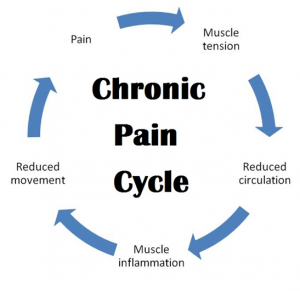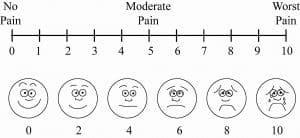Table of Contents
What is chronic pain?

There are two types of pain: acute and chronic. Acute pain lets you know that you may be injured or a have problem you need to take care of. Chronic pain lasts for weeks, months, or even years.
The original cause can be an injury or infection. There may be an ongoing cause of pain such as arthritis or cancer. In some cases, there is no clear cause.
How bad is my chronic pain?
Your clinic team will use this scale (see figure on right) to measure how bad your pain is.
Mild: Pain score of 3 or less on the VAS scale. This pain should not stop you from doing activities of daily life (preparing meals, managing money, shopping, doing housework, and using a telephone).

Moderate: Pain score of 4 to 6. This pain stops you from doing instrumental activities of daily life (medication management, housekeeping activities, ability to manage finances).
Severe: Pain score of 7 or higher. This pain is bad enough to stop you from even the most basic (self-care) activities of daily life (eating, dressing, getting into or out of a bed or chair, taking a bath or shower, and using the toilet).
How to manage early symptoms of chronic pain?
Keep track of your pain levels using Ankr (myAnkr web portal or the Ankr app). It will help you describe the pain to your doctor or nurse.
- Medicines include pain relievers, antidepressants, and anti-convulsants. Different types of medicines help people who have different types of pain. If your doctor recommends an over-the-counter pain reliever, read and follow the instructions on the box.
- Physical therapy includes stretching and activities to strengthen muscle.
- Low-impact exercise could include walking, swimming, or biking.
- Occupational therapy teaches you how to pace yourself and do ordinary tasks differently. This helps you reduce your pain or avoid re-injuring yourself.
- Behavioral therapy methods help you relax and decrease stress. They could include meditation, tai chi, or yoga.
- Complementary and Alternative Medicine (CAM) involves treatments that are not part of mainstream medical care. Acupuncture and massage are examples of these treatments. Talk to your doctor about any CAM procedures.
How to manage severe chronic pain?
Seek medical help immediately if you have
- Pain lasts for over a week
- Pain extending to other body parts
- Tingling, or weakness
- Agony after an accident
- Abnormal weight loss
- Fever
Severe cases could require more invasive treatment. It may include electrical stimulation, nerve blocks, or surgery. Talk to your doctor to learn how to best control your pain.
